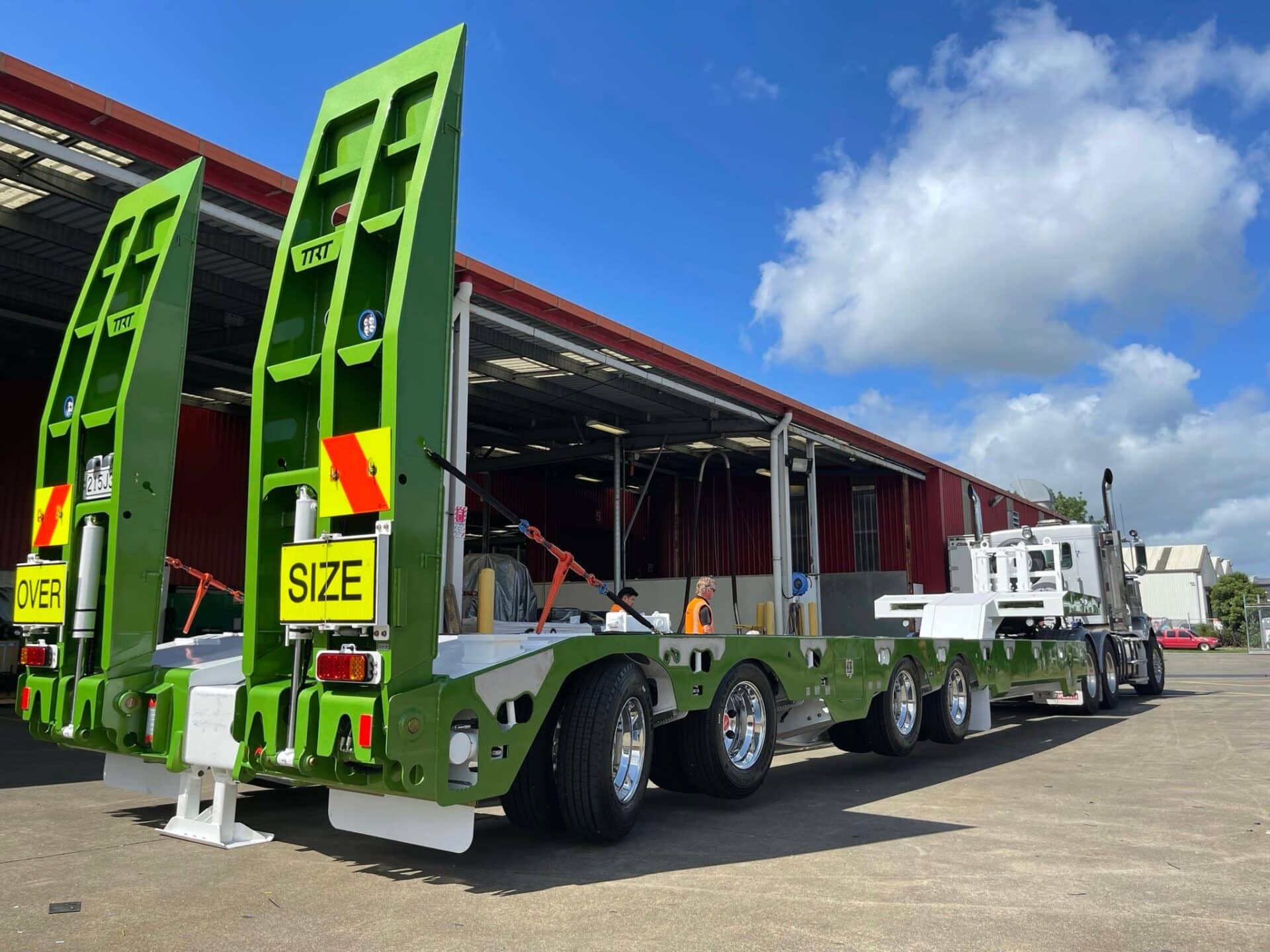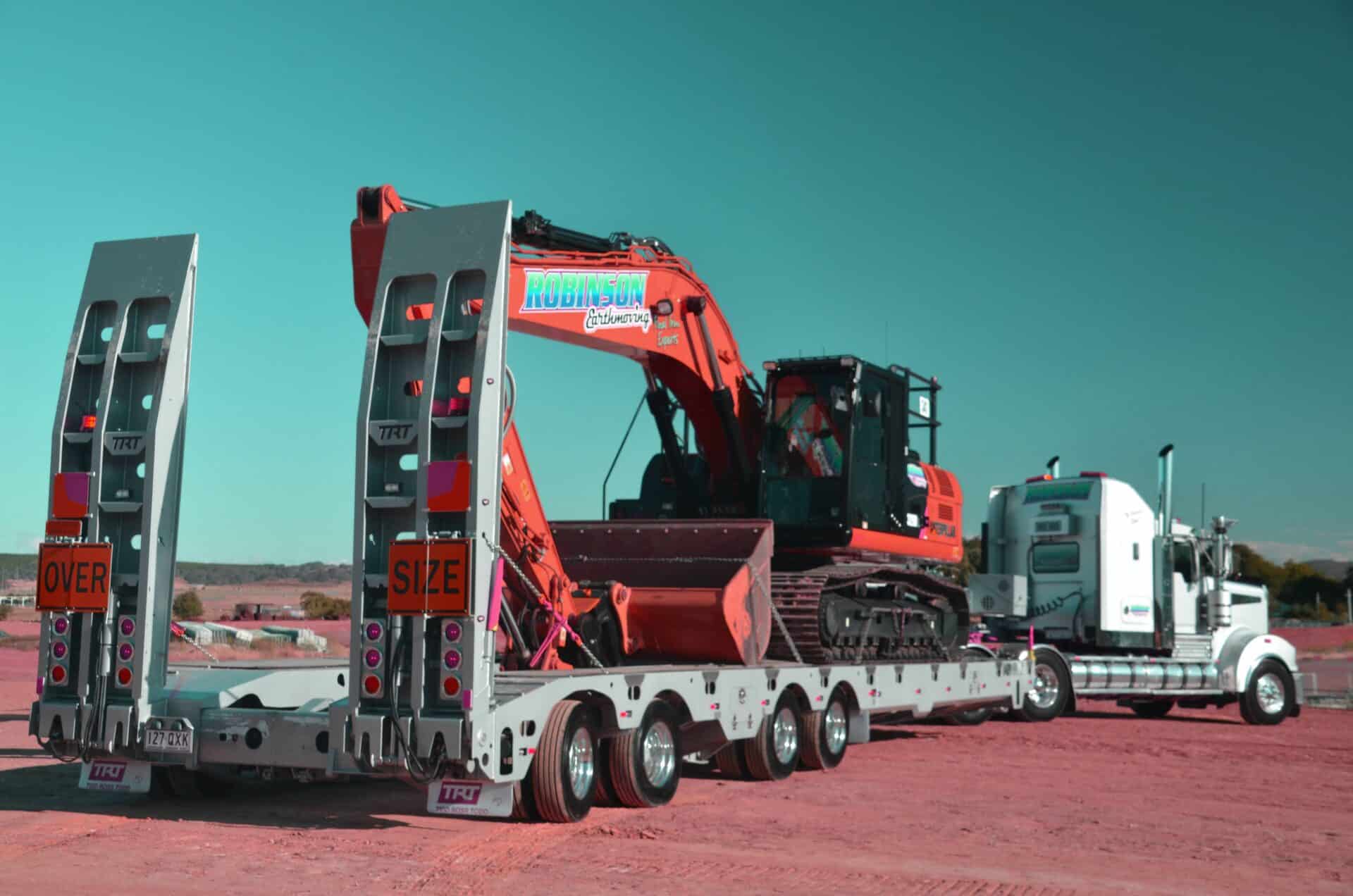Low loaders for sale are specialised trailers designed specifically for the efficient transportation of heavy and oversized loads. The defining characteristic of a low loader is its lowered deck height, which allows for easier loading and unloading of equipment that may exceed the height restrictions of standard trailers.
Unlike flatbed or box trailers that sit at a higher elevation, low loaders are engineered with a lower centre of gravity. This design not only enhances stability during transit but also minimises the risk of tipping or swaying, especially when navigating winding roads or uneven surfaces.
Popular Uses in Australia
In Australia, low loaders serve as indispensable tools across various sectors, including construction, mining, and agriculture.
- Construction: The construction industry heavily relies on low loaders to transport essential machinery such as excavators, bulldozers, and cranes to job sites. With many construction projects located in remote or rugged areas, having a reliable low loader is vital for ensuring that equipment reaches its destination safely and efficiently.
- Mining: The mining sector is another significant user of low loaders, transporting large and heavy equipment like haul trucks and drilling rigs across challenging terrains. The ability of low loaders to carry substantial weights while maintaining stability makes them a preferred choice for mining companies looking to streamline their operations.
- Agriculture: In the agricultural sector, farmers utilise low loaders to move tractors, harvesters, and other farming machinery. The vast landscapes of Australia require robust and reliable transportation solutions, making low loaders an integral part of farming operations.
Given the vast distances and varied terrain across Australia, strict regulations govern heavy vehicle transportation. These regulations ensure the safety of the vehicle, its load, and other road users. Understanding these regulations is crucial for businesses operating in sectors that rely on low loaders.
Key Features of a Low Loader
Design and Structure
The design of a low loader is tailored to maximise functionality and safety. One of the most notable features is the deck height, which is significantly lower than that of standard trailers. This allows for easier loading and unloading of heavy equipment, reducing the need for additional machinery like cranes or forklifts.
Another essential feature is the axle configuration. Low loaders often come with multiple axles, which help distribute the weight of the load more evenly across the trailer. This distribution not only enhances stability but also reduces wear and tear on the vehicle, making it easier to manoeuvre, especially when navigating tight turns or uneven surfaces.
The gooseneck design of low loaders is another critical aspect. This feature allows for better turning radius and overall stability during transport. The gooseneck connects the trailer to the towing vehicle, providing a strong and secure link that enhances control and handling.
In Australia, preferences for specific designs may vary by region and industry. For example, construction companies might favour low loaders with more robust designs to handle heavy machinery, while agricultural users may opt for models with added features for versatility.
Load Capacity
Load capacity is a crucial consideration when selecting a low loader. Depending on the model and design, a typical low loader can carry loads ranging from 20 to 80 tonnes or more. Understanding the load capacity is essential, as overloading can lead to significant safety risks, legal penalties, and damage to the vehicle.
Different weight categories matter greatly in terms of operational efficiency and safety. For instance, a low loader designed to carry heavier loads will often come with reinforced structures and more robust axles to support that capacity. Buyers must ensure they select a low loader that meets the specific needs of their industry while remaining compliant with Australian regulations.
Customisable Options
Many low loaders offer customisable features to cater to the diverse needs of Australian industries. These tailored options allow businesses to adapt their low loaders for specific tasks or challenges they may face.
Hydraulic suspension is one such feature that significantly enhances ride quality and load stability. This system allows the trailer to adjust to uneven surfaces, which is particularly beneficial for industries that operate in rugged terrains, such as mining and construction.
Additional options include ramps, which can be hydraulic or foldable, facilitating easy loading and unloading of heavy machinery. Ramps are especially useful for businesses that frequently transport large equipment, as they reduce the time and effort required for loading tasks.
Side extensions can also be added to increase the loading width, allowing for the transportation of larger equipment. These customisable options ensure that businesses can select a low loader that best fits their operational requirements, ultimately improving efficiency and safety.
Types of Low Loaders Available in Australia
Standard Low Loaders
Standard low loaders are versatile and cost-effective options for general use. They are well-suited for transporting medium loads and are a popular choice among contractors and small businesses. With their reliable design and lower cost compared to specialised models, standard low loaders can accommodate various machinery and equipment.
Extendable Low Loaders
For businesses that frequently transport oversized loads, extendable low loaders are an excellent choice. These trailers are designed with adjustable lengths, allowing them to accommodate loads that exceed standard dimensions. This flexibility is particularly advantageous for industries like mining, where equipment sizes can vary significantly. Extendable low loaders enable companies to transport large machinery without needing multiple trips, saving time and costs.
Drop Deck and Flat Deck Variants
Low loaders come in various configurations, including drop deck and flat deck variants.
- Drop Deck Low Loaders: These trailers feature a lower height at the rear, making them particularly effective for transporting taller equipment. The drop deck design allows for easier access, ensuring that heavy machinery can be loaded and unloaded safely.
- Flat Deck Low Loaders: While these provide a versatile platform for various loads, they may not accommodate the same height restrictions as drop deck models. Flat deck low loaders are ideal for transporting items that require a stable surface but do not exceed standard height limits.
Low Loader Trailers with Hydraulic Suspension
Low loader trailers equipped with hydraulic suspension offer significant benefits, particularly for navigating Australia’s rough terrains. The hydraulic system helps maintain stability and reduces wear on both the load and the trailer, providing a smoother ride over uneven surfaces. This feature is especially valuable for businesses operating in remote or rural areas where road conditions can vary widely.

Key Considerations When Buying a Low Loader in Australia
New vs. Used
When searching for a low loader for sale, one of the first decisions to make is whether to purchase new or used. New low loaders come with warranties and the latest technology, ensuring top performance and reliability. They also provide peace of mind, knowing that you are investing in a vehicle that meets current safety and compliance standards.
On the other hand, used models can offer significant cost savings. However, buyers should conduct thorough inspections of used low loaders to confirm they meet safety and performance standards. Inspecting the trailer for signs of wear, structural integrity, and overall functionality is crucial. This diligence can help prevent future issues and ensure a safe transportation experience.
Price and Financing Options
Prices for low loaders in Australia can vary widely, generally ranging from AUD 30,000 to over AUD 100,000, depending on the type and features. Many Australian businesses offer financing solutions, including loans and leases, to support the purchase of these essential vehicles. Understanding the various financing options available can help businesses make informed decisions that align with their budgets and operational needs.
Local Compliance and Road Safety Regulations
Adhering to Australian safety standards is crucial for operating low loaders. Compliance with local road safety regulations ensures safe transportation of loads. Potential buyers should be aware of the necessary permits and certifications required for operating low loaders, which may vary by state and territory. This awareness is essential for maintaining legal compliance and avoiding fines or penalties.
Where to Buy Low Loaders in Australia
Top Australian Dealers
Australia boasts several reputable low loader manufacturers and dealers, offering a wide range of models and configurations. Leading dealers include:
- Freighter: Known for their durable low loaders that are suitable for heavy-duty applications, Freighter offers a variety of models tailored to different industry needs.
- Hawkeye Trailers: This dealer provides a selection of customisable low loader options designed for various industries, ensuring that buyers can find a trailer that fits their specific requirements.
- Lindsay Australia: With a focus on safety and compliance, Lindsay Australia offers a diverse range of low loaders suitable for different operational needs.
Online Marketplaces
Numerous online platforms list low loaders for sale, allowing buyers to compare options easily. Websites such as Truck Dealers, eBay, and Gumtree are popular among those seeking new or used low loaders. These platforms provide a comprehensive view of available models, helping buyers make informed decisions.
Second-Hand Market
The second-hand market for low loaders in Australia can offer excellent value for those willing to search for quality used options. Buyers should look for reputable sellers and be prepared to negotiate prices while ensuring that the vehicle meets their specific needs. Checking the vehicle’s history and maintenance records can provide additional peace of mind when purchasing a used low loader.
Maintenance and Servicing of Low Loaders
Regular Maintenance Tips
To ensure the longevity of a low loader, establishing a regular maintenance schedule is essential. This should include routine inspections of tires, brakes, and hydraulic systems. Regularly lubricating moving parts helps prevent wear and tear, extending the life of the trailer.
Additionally, checking load securement devices is vital to ensure compliance with safety standards. Properly securing loads not only protects the equipment being transported but also safeguards other road users from potential hazards.
Finding Service Providers in Australia
Identifying reputable low loader servicing companies is critical for keeping your equipment in optimal condition. Look for providers with experience in heavy vehicle maintenance and those who offer genuine parts designed for Australian conditions. Regular servicing and using quality parts can significantly reduce the likelihood of unexpected breakdowns and extend the trailer’s lifespan.
Conclusion
Investing in a low loader is a significant decision that can enhance the efficiency and safety of transporting heavy equipment across Australia. By understanding the features, types, and key considerations when buying a low loader, you can make informed choices that best suit your business needs. Whether you opt for a new or used model, ensure compliance with local regulations and maintain your trailer regularly to maximise its performance.
With a wealth of options available from trusted dealers and online platforms, finding the right low loader for your operations has never been easier. Embrace the power of low loaders and elevate your transportation capabilities today!
